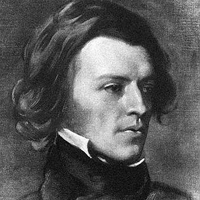Tears, Idle Tears by Alfred Lord Tennyson: Summary and Analysis
Tears, Idle Tears by Alfred Lord Tennyson is an elegy written in the desperate mood at the loss of the poet’s bygone days. The poet is reminded of his past life when his eyes fall upon happy autumn fields. The poet is very imaginative when he refers the first beam on glittering soil and draws a beautiful comparison. The poet is reminded of the past when he had an opportunity to observe sad consequences of a ship and the passengers.

Alfred L. Tennyson (1809-1892)
Freshness of the tear has been compared to the freshness of the first beam of the Sun. This is really highly imaginative. The poet is reminded of the darkness of the summer dawns when half-awakened birds express their sad and melancholy notes. The poet has referred some sad events of death, when the atmosphere was tragic which resulted into strange and sad tears. The poet is reminded of his beloved girl whom he used to kiss. Those lips which he kissed symbolized his pure love. But now after her death, the sweet memory is left. The poet is pained at heart. There is nothing except regret and remorse. His dis-appointment is expressed in the form of tears. Thus the poet has counted the sweet memory of his past life. His past is reflected in the form of pathos and tragedy. The poet has expressed his intense and sharp feeling on personal levels. Life-Death-Tears make main theme of this poem. The simplicity of language and narrative style make this poem very attractive and popular. Symbols, images and similes-enhance the poetic beauty and craftsmanship of the poet.
The memory of the past is fresh and strange for the speaker. Whenever the speaker goes back to remember his past, he feels sorry for his memorable days. He compares his past with many more images of the nature and comes to draw a conclusion that his past is no more alive. Weeping and crying at such moment is meaningless but still the speaker cannot separate himself from the glimmering square of the past. His past resembles the song of the birds on early summer mornings.
The speaker has been haunted by the sweet and lovely memories of his past. As the past gets recalled into his mentality, he can’t control himself and begins to shed tears. These tears come from divine despair and thy pass through the core of human heart to get poured down. It is as fresh as the first beam of sun glittering on sail. It is sad as the last beam of the sunset. The speaker declares the past to have been dear, sweet, deep and wild. His past is still as dear as the memory of the kisses of one who is now dead. It is as sweet as those kisses that we imagine ourselves in relation to others. The past is as deep as the first love and it is wild with all regard. The poet visualizes death in life. He is still alive but the memory of the past is hunting him frequently.
Related Topics
Break, Break, Break: Literary Analysis
Break, Break, Break: Critical Analysis
The Lotos Eaters: Critical Analysis
Victorian Consciousness in The Lotos Eaters
Lady Clare: Summary and Analysis
The Eagle: Fragment: Summary and Analysis
Elegy- Definition of Literary Term
Lyric- Definition of Literary Term
Salient Features of Victorian Literature
Biography of Alfred Lord Tennyson
 |
bachelorandmaster.com |